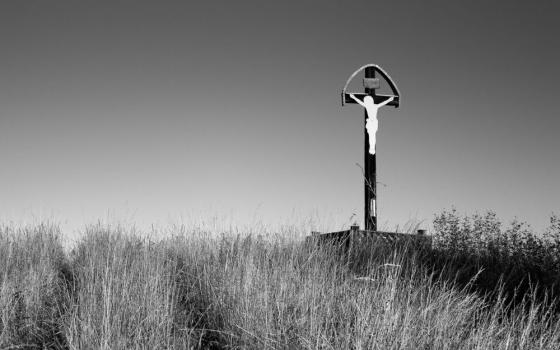
Rep. Jim Jordan, R-Ohio, chairman of the House Judiciary Committee during the House Judiciary Committee hearing on the Manhattan District Attorney's Office on Capitol Hill June 13 ( AP/Jose Luis Magana)
Scarcely a year ago, U.S. Rep. Jim Jordan of Ohio, chair of the House Judiciary Committee, lamented how Americans — specifically Catholics — were seeing "their First Amendment religious liberty rights attacked." This summer has found Jordan launching attacks of his own.
On July 30, the House Judiciary Committee announced it had requested information from "130 U.S.-based companies, retirement systems, and government pension programs about their involvement with the woke ESG cartel Climate Action 100+." ESG refers to investment strategies that focus on environmental, social and governance criteria that express a concern for ethical investing.
Ethical investment has become mainstream, so common that more than 100 firms, retirement systems and government pension programs could be contacted by Jordan’s committee. Forbes has covered ESG favorably. So has The Wall Street Journal. But in this polarized climate, Jordan’s judicial ambit has come to include being "woke," and if he says ESG is woke, it apparently is.
The committee has sent document preservation letters to several big investment firms, such as Franklin Templeton, Goldman Sachs, Mellon Investments and Strategic Global Advisors. The letters are a signal of committee hearings and subpoenas to come.
The committee’s Republican majority says it is mounting an antitrust investigation to determine whether "a 'climate cartel' consisting of left-wing activists and major financial institutions (is colluding) to impose radical environmental, social, and governance goals on American companies," and they have prepared a report detailing their allegations.
The committee’s Democrats published a minority report pointing out that Republicans seem to be arguing that preferring to avoid investing in fossil fuels amounts to collusive, anti-competitive conspiracy. Democrats further pointed out that investors enjoy the free speech protection of the First Amendment when they pursue investment strategies that uphold their convictions, and that seems quite right.
But the constitutional protection of free speech is not the most interesting way that the House Judiciary Committee’s majority is overlooking the First Amendment.
The committee not only has papered investment firms with document preservation letters, but they also have set their sights on the Sisters of Saint Dominic of Caldwell, Mercy Investment Services, Christian Brothers Investment Services and Loyola Marymount University.
These Catholic ministries and religious communities operate under the authoritative teachings of the Roman Catholic Church, which tell us, "Every economic activity making use of natural resources must … also be concerned with safeguarding the environment."
Pope Francis has spoken directly to the relationship between environmental concerns and investing when he wrote in his 2015 encyclical that "efforts to promote a sustainable use of natural resources are not a waste of money, but rather an investment capable of providing other economic benefits in the medium term." The U.S. Conference of Catholic Bishops has published its own Socially Responsible Investment Guidelines that name environmental, social and governance concerns.
Advertisement
Non-Catholic religious institutions also received document preservation letters from the judiciary committee’s majority that seems bent on investigating the exercise of their faith convictions. They include the Presbyterian Mission Agency, the Friends Fiduciary Corporation, JLens, Praxis Mutual Funds and The Pension Board of the United Church of Christ.
What these groups all share in common is a religiously derived ethical motivation to curate their investment strategies according to their beliefs. Taking those motivations at their face value, it seems as though the House Judiciary Committee is contemplating a ghastly intrusion on religious conscience — one all the more shocking given the committee’s noisy defenses of religious freedom last year.
Of course there are secular reasons to pursue ESG investing, and ESG is not specifically a religious investment practice. But religious and secular ethical motivations can align and often do. What matters is the claim that believers make, and Republicans generally have been the first to say so.
The judiciary committee’s interest in ESG practices is a signal that Republicans’ commitment to religious freedom ends when it challenges their partisan positions. Given the similar way that Texas Gov. Greg Abbott has targeted religious groups helping migrants this year, the prospects should alarm believers.
In their zeal to police "wokeness," oppose their adversaries and defend the fossil fuel industry by means of a questionable antitrust investigation, the House Judiciary Committee finds itself treading into the dangerous territory of restraining religious believers from investment practices that match their consciences. That’s a strange turn of events, and one that should attract the attention of religious leaders who have depended on Republicans for support.
It’s also a good reminder. Faith does not belong to any party. Genuine faith should thwart our partisan instincts. That means we never should be surprised to find out how "woke" religious belief really can be.







